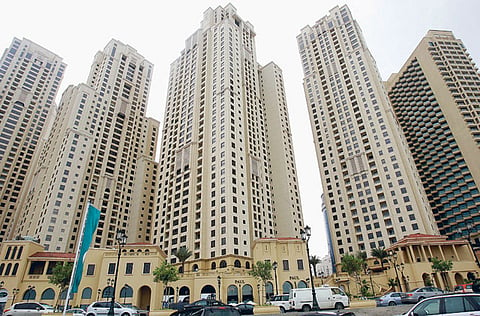Markets awaits lower interest rates
Non-performing loan exposure, delivery woes hurting real estate

Dubai: The real estate market in Dubai is banking on lower interest rates to get buyers back into the fold.
However, interest rates alone are unlikely to trigger a buying frenzy. There are other more burning issues.
"The non-performing loan exposure is the issue. When the market is down interests may come down but then the loan-to-value [LTV] ratio does so as well," says Saud Masoud, head of research and senior real estate analyst for the Middle East and North Africa at UBS.
Thinking back, plenty of people were quite happy to pay high interest rates during the boom at near-zero deposits. But that scenario is unlikely to repeat itself again, Masoud said.
"The 2007-2008 [phenomenon] is gone. People won't mind paying high interests as long as there is transparency. They want to know whether their assets will perform," he said.
In other words, it isn't so much the high interests but the stability of the market and returns to be made that buyers are interested in.
Minimising risk
In the absence of high profits buyers want to pay less, thus reducing their risks.
"Prices have fallen and so have rents but the return is still reasonable. The only issue is the mortgage interest rates and higher LTV ratios — probably lower than they could be," said Steve Morgan, director of Cluttons Dubai.
But have and are interest rates really unreasonably high as some perceive them to be?
Cyril Lincoln, vice-president of investment banking and head of asset finance and syndications at ADCB, doesn't think so.
"It isn't unusual for developing markets to have high interest rates. And there is a downward trend though on 2009 rates," he said.
A solid point made. A quick survey of global rates will result in one establishing that those complaining about high rates are probably looking to countries like the United Kingdom.
UK rates hovered around 6 to 7 per cent and more than halved, in some instances, when the housing market started to show its cracks.
Meanwhile, with developing markets like Brazil at around 8 per cent, Bulgaria up to 9 per cent and South Africa with 10.5 per cent, mortgage interest rates today probably offer a fairer comparison.
In India one would be hard pressed to find anything below 10 per cent.
In addition, lenders in the UAE are intent on doing better in reducing the previously common rates which used to range between 8 to 10 per cent.
Abu Dhabi Finance (ADF) has been taking the lead. Its lowest rate starts at 5.75 per cent with loan-to-value ratios of up to 85 and 75 per cent.
Existing clients can also expect to benefit over time. This rate brings the UAE closer to those of many mature markets.
To spur new buyers into action, joint campaigns with developers, intend to convert tenants in Abu Dhabi to homeowners.
Sorouh is offering an even lower and fixed rate of 4.99 per cent, albeit only for the first two years at an LTV of 85 with ADF.
"The emphasis should be placed on releasing funds back into the market and [thus] create attractive customer-centric interest rates," said Gurjit Singh, Sorouh's chief operating officer.
HSBC and Standard Chartered have also lowered their rates to below 7 per cent, with an LTV of 75, but can they afford to?
Subdued market
"Financing, despite bank loan books being in good shape, will remain difficult to come by this year due to the high costs of funding. But banks should help with the delivery of products this year," reckons Lincoln.
He admits that rates aren't the only issue to contend with. Existing customers are complaining about delays or non-delivery.
"Or property not delivered to promised specs," he added.
"The problem is that financing to customers is given on the basis of a certain delivery timespan. However, most of the end-users we finance are getting their units this year providing a soft landing. The delays are relatively well managed."
The question then that the market would likely ask is: as long as developers get the delivery right, the word should travel, people will buy and liquidity will come?
Only in good time, Masoud said, as he pointed out that real estate markets tend to take at least seven years to recover.
"There have to be some fundamental changes. It takes few years to figure out what you have, then take care of it and then create something new."
Not that investors won't come back; they know from the past that the UAE has a lucrative market to offer.
"The catch-22 is that we're now competing for money globally. Investors will come back but first the house needs to be cleaned up. Call it risk, quantify it and move on. That's what they want to hear."
impact
benefits not seen
Charles Arnestad, a South African chartered accountant, with an Ijara financing agreement with Tamweel on his villa in the Arabian Ranches, feels he is not benefiting from reductions in the Eibor rate.
"According to my ‘Rental Payment Schedule', the profit rate is determined based on 1-month EIBOR plus a margin of 4.5 per cent. Accordingly, I should be charged a flexible rate that adjusts monthly in accordance with the movements in the 1-month Eibor," Arnestad said.
At present, Arnestad is still paying 7.85 per cent, a reduction of just 0.05 per cent since September 2006, despite a reduction of the one-month Eibor rate by 3.81 per cent between September 2006 and February 2010.
According to Arnestad's understanding of the Ijara Financing Agreement he should be, based on the current Eibor rate at the end of February 2010, paying a profit rate of 4.6 per cent and not 7.85 per cent per annum. "Tamweel's cost of funding has decreased significantly with the decrease in Eibor rates, yet this decrease has not been passed on in full to their customers," he questioned.
— N.W.


